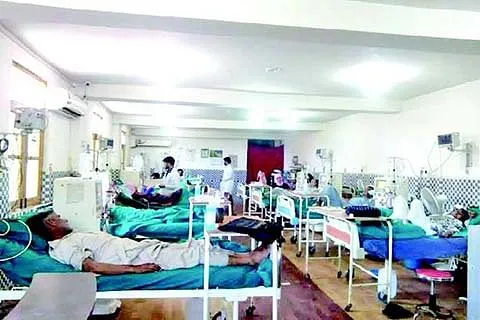Srinagar: As the whole world as well as Jammu and Kashmir is facing an unprecedented challenge due to COVID-19 pandemic, the Jammu and Kashmir Administration has amplified the medical infrastructure across the Union Territory to safeguard the lives of people and also to provide them best possible medical care facilities.
In order to strengthen the medical infrastructure across Jammu and Kashmir, more than 400 Health Infrastructure Projects/works worth Rs. 7177 Crores are being initiated here. Two new AIIMS with the project Cost of Rs 4000 Cr (Rs. 2000 Cr each) one each at Jammu
Division & Kashmir Division, seven new Government Medical Colleges being established with total Outlay of Rs. 1595 Cr. Ten new Nursing Colleges being set up with an approximate cost of Rs. 60 Crore. Two State Cancer Institutes coming up worth Rs. 240 Cr, one each at Jammu and Kashmir Division.
Jammu and Kashmir has also received Rs 881 crore for 140 health projects under PMDP out of which 75 projects have been completed and 26 projects will soon be completed.
World Bank is providing financial assistance of Rs 367 crore to Jammu and Kashmir, thereby further strengthening the health care institutions here.
In a series of steps towards addressing the issue of shortage of doctors in Jammu and Kashmir, various initiatives like establishment of five new medical colleges in addition to two new more Medical Colleges at Udhampur and Handwara, 500 additional MBBS seats in Government Medical College, out of which 85 seats are reserved for financially weaker sections, have been taken.
The new medical colleges have been upgraded by attaching them to the District Hospitals with all required facilities while as the existing 300 bedded hospitals will be developed into 500 bedded hospitals.
To overcome the shortage of post-graduate doctors and to prepare specialists at that level, the Health Department has also started Diploma of National Board Courses in the Government medical colleges and District Hospitals of the districts, which will increase at least 250 seats.
The infant mortality rate has come down from 32.4 to 16.3 per 1000. Sex Ratio at birth has increased from 923 to 976 per 1000. Institutional deliveries have increased from 7% to 92.4%.
In an another remarkable initiative for upgradation of health care infrastructure, the J&K Administration is going to set up two Medi-Cities; one each at Jammu and Kashmir divisions.
Apart from this, one major initiative of J&K government was preparation of health investment policy document for boosting private investment in the health sector to minimize the burden on the overburdened public health sector in J&K.
J&K has received investment proposals of over Rs 3,000 crore in the health-care and medical education sectors. The government of Jammu and Kashmir will offer support (by) providing land, financial aid and assistance subject to the State Health Care Investment Policy, 2019.
The project proposals will be cleared speedily through a Web-based single window, absolving the investors of the need for any physical touch point with the approving/licensing authorities.
Apart from these quality initiatives for upgradation of health infrastructure across Jammu and Kashmir, several health institutions have achieved national recognition under various schemes.
Under National Quality Assurance Programme, through which National Quality Assurance Standards (NQAS) certification is granted to hospitals for maintaining high standards in public health system, District Hospital, Udhampur became first hospital of J&K to be granted NQAS certification. Govt. Hospital, Gandhi Nagar, Jammu was also awarded NQAS certification. CHC Katra is the first CHC in the UT of J&K to be awarded NQAS certification. CHC Katra was also recognised for maintaining Laqshya standards.






